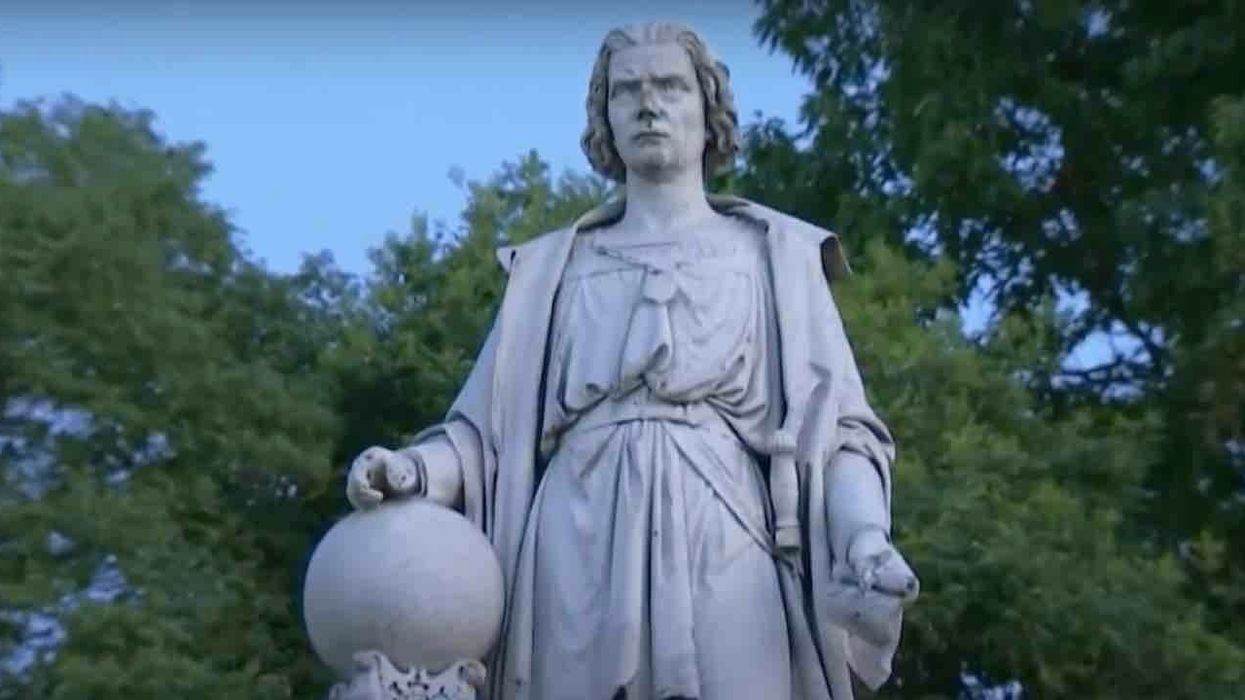
Image source: YouTube screenshot

'A victory for civilized society'
An attorney praised a judge for putting the brakes on the Philadelphia Art Commission's plan to remove a statue of Christopher Columbus from Marconi Plaza, where heated demonstrations have taken place in favor of and against the monument in the wake of George Floyd's death.
Attorney George Bochetto represents a group of South Philadelphia residents fighting to keep the statue in place, and he told the Philadelphia Inquirer that Judge Paula Patrick — who issued a temporary stay — made it "crystal clear that she will not tolerate mob rule or kangaroo tactics."
Bochetto added to the paper that the judge's stay is "not just a victory for the Columbus Statue, [but] a victory for civilized society."
In June, about 100 people — some of them carrying bats, golf clubs, sticks, and even guns — decided to protect the Columbus statue from possible vandalism given that left-wing rioters in other parts of the country beheaded, toppled, and vandalized statues and monuments in their fury over racism and Floyd's death in Minneapolis.
The crew of folks protecting the Columbus statue attracted the attention of those against it, and things got heated between the two sides.
Philadelphia Mayor Jim Kenney indirectly referred to the behavior of those guarding the statue as "vigilantism," and District Attorney Larry Krasner called them "criminal bullies."
Armed Group Surrounds South Philly Christopher Columbus Statue | NBC10 Philadelphiayoutu.be
Afterward, the city covered the Columbus statue in plywood, the Inquirer said, and a police cruiser has been stationed near the statue to make sure things stay calm.
More from the paper:
In July, city officials proposed a plan to remove the statue, arguing it threatened public safety and should be relocated "in recognition of the fact that Columbus' legacy includes the enslavement, forcible removal, and the devastation of the Indigenous people that he encountered, and that in this current moment in our country's history, the statue can no longer be displayed on public property."
Those in favor of keeping the statue at Marconi say it celebrates Italian American culture in a city steeped in Italian heritage. Those against it say it's a painful reminder of atrocities against Indigenous people directed by Columbus. The statue has been at the plaza since 1976.
The statue's removal will be paused until the judge rules on another motion to prevent moving the statue while the case is appealed, the Inquirer said, adding that attorneys said the city cut legal corners in the case and rushed the process to dismantle the statue.
The art commission voted 8-0 — with Commissioner Joe Laragione abstaining — in favor of the statue's relocation as long as the city report every six months on progress regarding a new location for the statue accessible to the public, the paper said.
"It's a serious piece of art, it was a gift of the Italian government in the 1800s. It needs to be stored and protected so that something can be figured out," Commission Chair Alan Greenberger said, according to the Inquirer. "The worst thing in my view that can happen, as many of you said, is that it stays in storage and is forgotten."
Some commissioners questioned whether removing the statue would set a precedent for taking down other pieces of public art in Philadelphia, the paper added.
More from the Inquirer:
The commission's deciding vote comes two weeks after the Philadelphia Historical Commission also endorsed a city proposal to remove the statue on the grounds of public safety. Commissioners said that if it were allowed to remain at Broad Street and Oregon Avenue, it would continue to be a flash point for protests, making the statue itself susceptible to damage.
"As Philadelphia — and the nation — continue to reckon with the deep legacy of racism and oppression in America, it is critical that our public spaces are seen as safe, welcoming and inclusive for all people," city spokesperson Lauren Cox told the paper. "Philadelphia's public art must reflect the people and spirit of our city, not divide us."